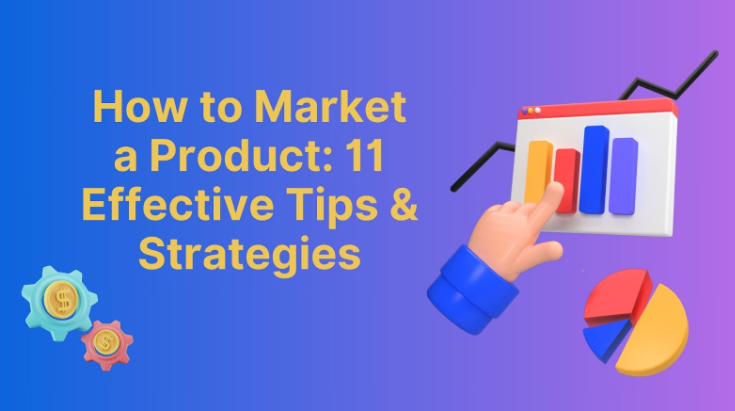
Marketing a product can feel overwhelming, especially with so many options and strategies available. But the truth is, successful marketing comes down to understanding your customers and using simple, proven methods to reach them.
In this post, you’ll discover 11 effective tips and strategies that can help you promote your product clearly and confidently.
What Is Product Marketing?
Product marketing is the process of introducing a product to the right audience and helping customers understand why they need it. It’s not just about selling—it’s about making sure the product fits the needs and interests of the people who might buy it.
This involves learning who your customers are and what challenges they face. You then craft clear messages that explain how your product provides solutions. You also work with different teams—like design, sales, and customer service—to make sure everyone knows what the product offers and how to talk about it.
Whether you’re launching a mobile app or running a printing on demand business, product marketing plays a key role in shaping how your offering stands out in the market. It includes activities like planning launches, setting pricing, and gathering customer feedback. Without it, even strong products can go unnoticed.
How to Market a Product: 11 Effective Tips & Strategies
Make Gift Guides or Collections of Bundles
Bundle your items into collections or gift sets to make purchasing easier. Bundles can help your products be more attractive by showing customers how the items complement each other.
This has the potential to prompt people to purchase items they might not otherwise consider. Consider what problems your products solve together and use those solutions as a lens through which to design bundles.

Custom 3-Pack Gift Wrapping Paper Sheets (Made in USA) – Print on Demand Fulfillment
Leverage Social Media with Customer-Generated Content
Encourage your clients to post about your company and its products on social media. Authentic content from actual customers creates trust and helps potential buyers understand what they’re getting.
Posting this type of content can also humanize your brand. Create a branded hashtag to make it easy to collect people’s posts and motivate more folks to join the conversation.
Leverage Email Signup Incentives
You can offer some practical benefits to entice users to leave their email addresses, such as shopping discounts or useful content. This will not only build a connection but also make it easier for users to get information about your latest products or services.
Ensure that signing up is easy and the incentive aligns with what your audience values.
Run Targeted Ad Campaigns
Target your marketing to likely customers. Precise targeting can help you spend your money wisely and connect with the right people at the best times. Don’t start big with your budget — test different audience segments to see what works best.
Showcase Customer Testimonials and Reviews
Including genuine customer reviews on your website and in your promotional content can help enhance your product’s credibility. Positive feedback can reassure potential buyers and demonstrate existing users’ approval and satisfaction with your product.
Make it easy for customers to leave reviews and let them know their feedback is appreciated.

Optimize Your Site for SEO
Check your SEO to make sure it’s targeting the kinds of keywords people use when they search. Good SEO creates steady organic traffic without the need for additional promotion.
Also, make sure your site loads quickly and works well to keep people engaged when they arrive.
Work with Influencers and Brand Ambassadors
Collaborate with people who have followers that would like products similar to yours. Their endorsements can bring your brand to new potential customers and provide a credibility lift. Foster genuine relationships for long-term partnerships, even beyond one campaign.
Build a Customer Loyalty Program
Motivate a second purchase by giving customers incentives like discounts or points. A well-crafted loyalty program can improve customer retention, transforming casual buyers into loyal brand advocates.
Ensure the incentives are simple to understand and that they’re truly worth working towards to keep customers motivated.
Partner with Complementary Brands
Partner with businesses that offer a product or service similar to yours but aren’t in competition with you. Collaborative efforts, such as co-promotions or joint offers, can allow both of you to reach each other’s audiences.
Select partners with the most overlap in customers to your desired market for best results.
Join Online Communities and Forums
Participate in places where your ideal customers are talking about subjects related to what you sell. Providing timely advice — not a sales pitch — enhances your reputation and may generate interest in your brand.
Being consistent is critical — the more you participate, the more likely you are to become a trusted voice in these communities.
Use Your Brick-and-Mortar Store to Grow Online
If you have a brick-and-mortar location, leverage it as an opportunity to drive traffic to your online store. Collect email addresses when customers come into the shop, or advertise your website and social channels in-store.
Try holding special deals or events in your shop that encourage customers to browse online as well.
Conclusion
Marketing a product takes time, testing, and patience—but with the right strategies, it becomes much more manageable. The 11 tips we’ve covered give you a solid starting point to build your plan, whether you’re selling online, in-store, or both.
Try different approaches, pay attention to what works, and keep adjusting as you go. That’s how strong, lasting marketing happens.
